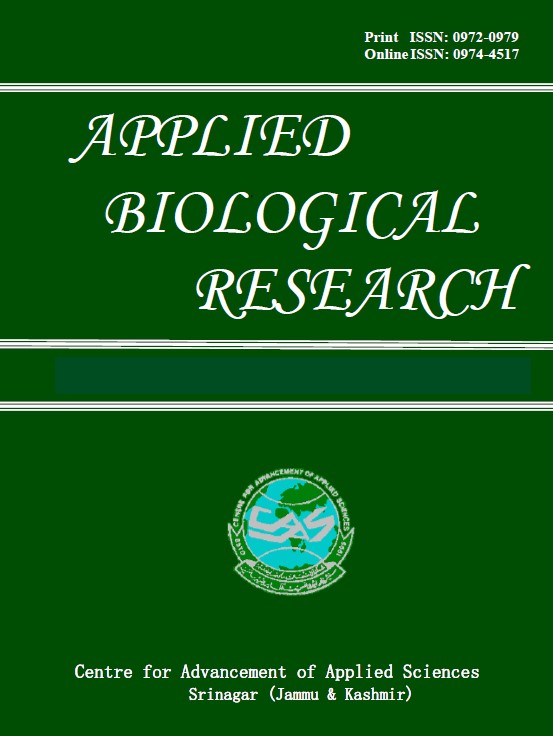Occurrence Of Parasitic Infections In Dogs In And Around Ludhiana, Punjab (India)
DOI:
https://doi.org/10.48165/Keywords:
Canine, gastro-intestinal parasites, haemoprotozoa, PunjabAbstract
A total of 634 canines were sampled for both haematological (460) and coprological (174) investigations at Small Animal Clinics, GADVASU, Ludhiana, India during the year 2010. Examination of Giemsa stained peripheral blood smears exhibited 10.21% (47/460) haemoprotozoan comprizing of Babesia gibsoni (8.26%), Hepatozoon canis (1.08%), B. canis (0.65%) and Trypanosoma evansi (0.21%). B. gibsoni infection was significantly higher (p<0.05) in male dogs. Coprological examination revealed that the prevalence of gastro-intestinal parasitic infection was 24.71% (43/174). Among these Isospora spp. and Ancylostoma spp. were 2.29 and 22.41%, respectively. The present work emphasized that B. gibsoni and hookworms were most prevalent blood- and gastro-intestinal parasites in canines in and around Ludhiana, Punjab (India).
Downloads
References
Agnihotri, R.K., Sharma, D. and Sharma, Y. 2008. Incidence of gastrointestinal helminths in dogs of Himachal Pradesh. Journal of Veterinary Parasitology, 22: 67-68.
Bashir I.N., Chaudhry, Z.I., Ahmed, S. and Saeed, M.A. 2009. Epidemiological and vector identification studies on canine babesiosis. Pakistan Veterinary Journal, 29: 51-54. Coles, E.H. 1986. Veterinary Clinical Pathology (4th edn.). W B Saunder’s Company. Philadelphia. USA.
Juyal, P.D., Sandhu, B.S., Kalra, I.S. and Sood, N. 1992. Ehrlichia canis and Hepatozoon canis in naturally infected dogs in Punjab. Journal of Veterinary Parasitology, 6: 21-25. Kachawha, S. and Tanwar, R.K. 2007. Prevalence of worm infestations in stray dogs in and around Jodhpur. Journal of Veterinary Parasitology, 21: 171-172.
Sahai, B.N. 1969. A survey of the helminth parasites of stray dogs in and around Bareilly, Uttar Pradesh. Indian Veterinary Journal, 46: 734.
Sharma, R.L., Ranga Rao, G.S.C. and Varshney, J.P. 1997. Parasitic diseases of canines - An overview. International Journal of Animal Sciences, 12: 231-244.
Sharma, S.K., Sinha, S.R.P., Sinha, S., Kumar, L. and Mahtha, R.K. 2006. Gastrointestinal helminthic parasites and treatment in different breeds of dogs. Indian Veterinary Journal, 83: 834-836. Singh, B., Kalra, I.S., Gupta, M.P. and Nauriyal, D.C. 1993. Trypanosoma evansi infection in dogs: Seasonal prevalence and chemotherapy. Veterinary Parasitology, 50: 137-141. Singh, N.K., Jyoti, Haque, M., Singh, H. and Rath, S.S. 2011. Prevalence of canine parasitic infections. Indian Veterinary Journal, 88: 76-77.
Soulsby, E.J.L. 1982. Helminths, Arthropods and Protozoa of Domesticated Animals (7th edn.). Blackwell Scientific Publications, London, UK.
Traub, R.J., Robertson, I.D., Irwin, P., Mencke, N. and Thompson, R.C.A. 2004. Application of a species-specific PCR-RFLP to identify Ancylostoma eggs directly from canine faeces. Veterinary Parasitology, 123: 245–255.

